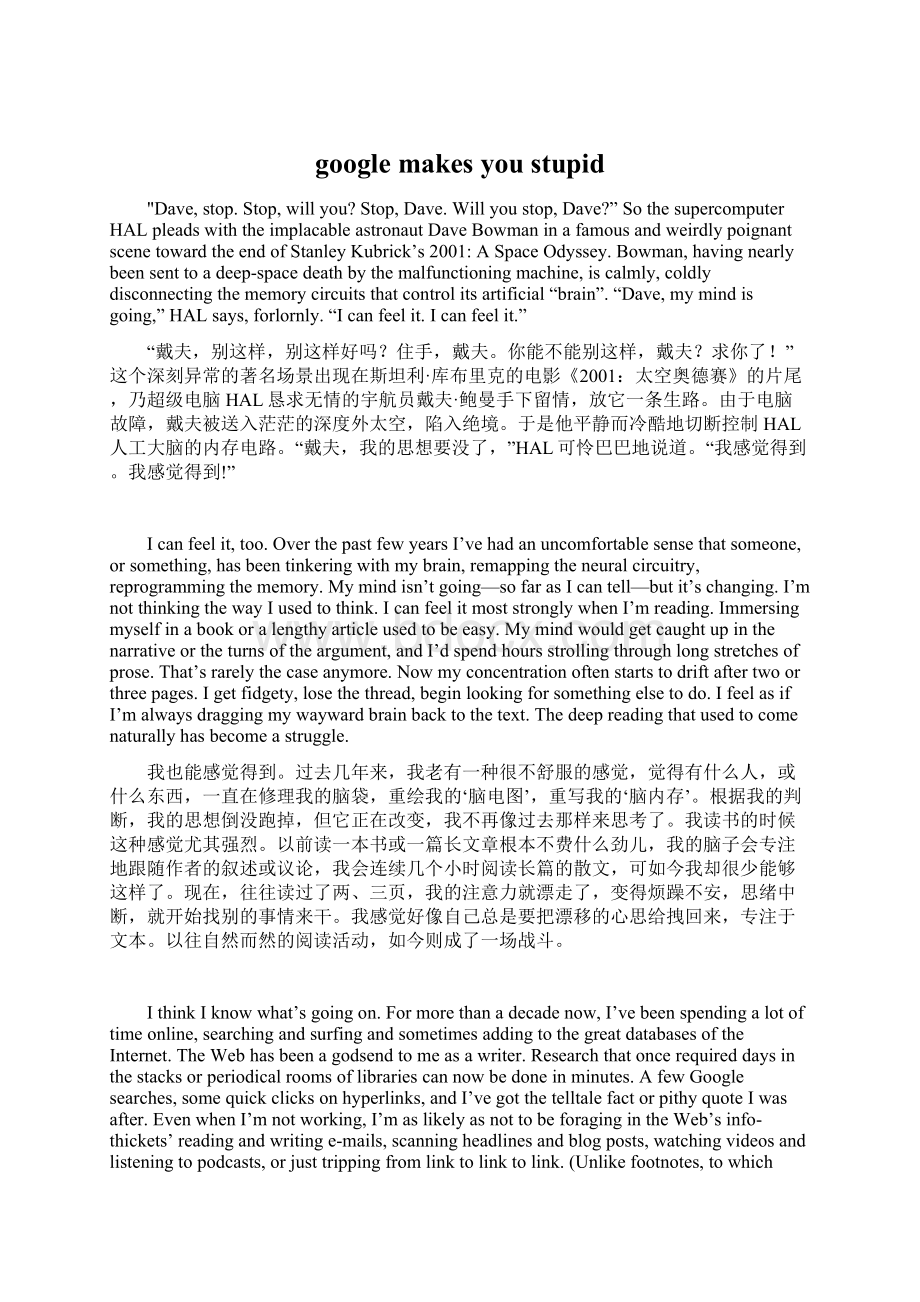google makes you stupid.docx
《google makes you stupid.docx》由会员分享,可在线阅读,更多相关《google makes you stupid.docx(14页珍藏版)》请在冰豆网上搜索。

googlemakesyoustupid
"Dave,stop.Stop,willyou?
Stop,Dave.Willyoustop,Dave?
”SothesupercomputerHALpleadswiththeimplacableastronautDaveBowmaninafamousandweirdlypoignantscenetowardtheendofStanleyKubrick’s2001:
ASpaceOdyssey.Bowman,havingnearlybeensenttoadeep-spacedeathbythemalfunctioningmachine,iscalmly,coldlydisconnectingthememorycircuitsthatcontrolitsartificial“brain”.“Dave,mymindisgoing,”HALsays,forlornly.“Icanfeelit.Icanfeelit.”
“戴夫,别这样,别这样好吗?
住手,戴夫。
你能不能别这样,戴夫?
求你了!
”这个深刻异常的著名场景出现在斯坦利·库布里克的电影《2001:
太空奥德赛》的片尾,乃超级电脑HAL恳求无情的宇航员戴夫·鲍曼手下留情,放它一条生路。
由于电脑故障,戴夫被送入茫茫的深度外太空,陷入绝境。
于是他平静而冷酷地切断控制HAL人工大脑的内存电路。
“戴夫,我的思想要没了,”HAL可怜巴巴地说道。
“我感觉得到。
我感觉得到!
”
Icanfeelit,too.OverthepastfewyearsI’vehadanuncomfortablesensethatsomeone,orsomething,hasbeentinkeringwithmybrain,remappingtheneuralcircuitry,reprogrammingthememory.Mymindisn’tgoing—sofarasIcantell—butit’schanging.I’mnotthinkingthewayIusedtothink.IcanfeelitmoststronglywhenI’mreading.Immersingmyselfinabookoralengthyarticleusedtobeeasy.Mymindwouldgetcaughtupinthenarrativeortheturnsoftheargument,andI’dspendhoursstrollingthroughlongstretchesofprose.That’srarelythecaseanymore.Nowmyconcentrationoftenstartstodriftaftertwoorthreepages.Igetfidgety,losethethread,beginlookingforsomethingelsetodo.IfeelasifI’malwaysdraggingmywaywardbrainbacktothetext.Thedeepreadingthatusedtocomenaturallyhasbecomeastruggle.
我也能感觉得到。
过去几年来,我老有一种很不舒服的感觉,觉得有什么人,或什么东西,一直在修理我的脑袋,重绘我的‘脑电图’,重写我的‘脑内存’。
根据我的判断,我的思想倒没跑掉,但它正在改变,我不再像过去那样来思考了。
我读书的时候这种感觉尤其强烈。
以前读一本书或一篇长文章根本不费什么劲儿,我的脑子会专注地跟随作者的叙述或议论,我会连续几个小时阅读长篇的散文,可如今我却很少能够这样了。
现在,往往读过了两、三页,我的注意力就漂走了,变得烦躁不安,思绪中断,就开始找别的事情来干。
我感觉好像自己总是要把漂移的心思给拽回来,专注于文本。
以往自然而然的阅读活动,如今则成了一场战斗。
IthinkIknowwhat’sgoingon.Formorethanadecadenow,I’vebeenspendingalotoftimeonline,searchingandsurfingandsometimesaddingtothegreatdatabasesoftheInternet.TheWebhasbeenagodsendtomeasawriter.Researchthatoncerequireddaysinthestacksorperiodicalroomsoflibrariescannowbedoneinminutes.AfewGooglesearches,somequickclicksonhyperlinks,andI’vegotthetelltalefactorpithyquoteIwasafter.EvenwhenI’mnotworking,I’maslikelyasnottobeforagingintheWeb’sinfo-thickets’readingandwritinge-mails,scanningheadlinesandblogposts,watchingvideosandlisteningtopodcasts,orjusttrippingfromlinktolinktolink.(Unlikefootnotes,towhichthey’resometimeslikened,hyperlinksdon’tmerelypointtorelatedworks;theypropelyoutowardthem.)
我想我知道究竟是怎么回事。
过去这十多年来,我在网上花了好多时间,在互联网这个庞大的数据库中冲浪,搜寻,有时也会在上面发布些什么。
对于我这样的作家,网络就像天赐宝物,过去要在图书馆的书堆或期刊室里花上好几天做的研究,现在几分钟就能搞定。
Google几下,鼠标快速地点击几下超链接,我想要的那些很能说明问题的事实与简洁精练的引语就都有了。
即便不工作的时候,我也很可能是在网络的信息密林里觅食:
阅读和撰写电子邮件,浏览新闻标题和博客,收听收看播客和网络视频,要么就是一个链接一个链接地瞎点瞎转悠。
(超链接有时被比作脚注,但跟脚注不同,超链接不只是给你指出相关文献,而是把你驱赶到那些文献。
)
Forme,asforothers,theNetisbecomingauniversalmedium,theconduitformostoftheinformationthatflowsthroughmyeyesandearsandintomymind.Theadvantagesofhavingimmediateaccesstosuchanincrediblyrichstoreofinformationaremany,andthey’vebeenwidelydescribedanddulyapplauded.“Theperfectrecallofsiliconmemory,”Wired’sCliveThompsonhaswritten,“canbeanenormousboontothinking.”Butthatbooncomesataprice.AsthemediatheoristMarshallMcLuhanpointedoutinthe1960s,mediaarenotjustpassivechannelsofinformation.Theysupplythestuffofthought,buttheyalsoshapetheprocessofthought.AndwhattheNetseemstobedoingischippingawaymycapacityforconcentrationandcontemplation.MymindnowexpectstotakeininformationthewaytheNetdistributesit:
inaswiftlymovingstreamofparticles.OnceIwasascubadiverintheseaofwords.NowIzipalongthesurfacelikeaguyonaJetSki.
对我来说如此,对别人也是如此,网络正在变成一种万有媒介,一种信息管道,经由它,信息通过我的眼睛和耳朵进入我的思想。
能够即时访问如此令人难以置信的海量信息存储有诸多的好处,人们已经对此进行了广泛的描述和足够的赞美。
《连线》杂志的克里夫·汤普森曾经写道:
“硅晶记忆的完美调用对于思维有着莫大的裨益。
”但是这种好处是有代价的。
正如媒体研究专家马歇尔·麦克卢汉在20世纪60年代所指出的那样,媒体可不仅仅是被动的信息渠道。
它们提供思考的原料,但同时也在塑造着思考的过程!
网络似乎正在一点点地销蚀我专注与沉思的能力。
现如今,我的脑袋就盼着按照网络提供信息的方式来获取信息,即以飞速运动的粒子流的方式。
过去我是个语言海洋中的深潜者,现在我好像踩着喷气滑水板,在海面上急速掠过。
I’mnottheonlyone.WhenImentionmytroubleswithreadingtofriendsandacquaintances—literarytypes,mostofthem—manysaythey’rehavingsimilarexperiences.ThemoretheyusetheWeb,themoretheyhavetofighttostayfocusedonlongpiecesofwriting.SomeofthebloggersIfollowhavealsobegunmentioningthephenomenon.ScottKarp,whowritesablogaboutonlinemedia,recentlyconfessedthathehasstoppedreadingbooksaltogether.“Iwasalitmajorincollege,andusedtobe[a]voraciousbookreader,”hewrote.“Whathappened?
”Hespeculatesontheanswer:
“WhatifIdoallmyreadingonthewebnotsomuchbecausethewayIreadhaschanged,i.e.I’mjustseekingconvenience,butbecausethewayITHINKhaschanged?
”
我不是唯一一个遇到此种问题的人。
当我向朋友和熟人倾诉我阅读的苦恼(大多数都是文学类书籍),许多人告诉我他们也有相似的经历。
上网上的越多,就越需要十分努力才能集中精力于那些长篇的作品。
一些博客博主也开始提及这一现象。
专门探讨在线媒体的博客博主斯科特·卡普最近承认,他已完全放弃了读书。
卡普写道:
“这是怎么了?
我在大学是主修文学的,曾经是那么个饥渴的大书虫。
”他说道:
“如果我在网上阅读太多,并不是因为我的阅读方式已经改变,比如说我只是求个方便,而是我的‘思维’方式改变了,那该怎么办呢?
”
BruceFriedman,whoblogsregularlyabouttheuseofcomputersinmedicine,alsohasdescribedhowtheInternethasalteredhismentalhabits.“Inowhavealmosttotallylosttheabilitytoreadandabsorbalongisharticleontheweborinprint,”hewroteearlierthisyear.ApathologistwhohaslongbeenonthefacultyoftheUniversityofMichiganMedicalSchool,Friedmanelaboratedonhiscommentinatelephoneconversationwithme.Histhinking,hesaid,hastakenona“staccato”quality,reflectingthewayhequicklyscansshortpassagesoftextfrommanysourcesonline.“Ican’treadWarandPeaceanymore,”headmitted.“I’velosttheabilitytodothat.Evenablogpostofmorethanthreeorfourparagraphsistoomuchtoabsorb.Iskimit.”
长期在密歇根医学院任教的病理学家布鲁斯·弗里德曼(BruceFriedman)定期在其博客上探讨医学领域中电脑的运用情况。
在其博客上,他描述了互联网如何改变了他的思维习惯。
他说:
“现在我几乎完全丧失了阅读稍长一点的文章的能力,不管是网络版,还是纸质版。
”他在电话里十分详尽地告诉我,他的思维呈现出一种“碎读”(staccato)特性,呈现出其上网快速浏览多方短文的方式。
“我再也读不了《战争与和平》了。
”弗里德曼说,“我已丧失了这种能力。
即便是篇幅在三、四段以上的博文,对我来说都太长,难以接收,往往只是快速扫一眼就跑。
”
Anecdotesalonedon’tprovemuch.Andwestillawaitthelong-termneurologicalandpsychologicalexperimentsthatwillprovideadefinitivepictureofhowInternetuseaffectscognition.Butarecentlypublishedstudyofonlineresearchhabits,conductedbyscholarsfromUniversityCollegeLondon,suggeststhatwemaywellbeinthemidstofaseachangeinthewaywereadandthink.Aspartofthefive-yearresearchprogram,thescholarsexaminedcomputerlogsdocumentingthebehaviorofvisitorstotwopopularresearchsites,oneoperatedbytheBritishLibraryandonebyaU.K.educationalconsortium,thatprovideaccesstojournalarticles,e-books,andothersourcesofwritteninformation.Theyfoundthatpeopleusingthesitesexhibited“aformofskimmingactivity,”hoppingfromonesourcetoanotherandrarelyreturningtoanysourcethey’dalreadyvisited.Theytypicallyreadnomorethanoneortwopagesofanarticleorbookbeforetheywould“bounce”outtoanothersite.Sometimesthey’dsavealongarticle,butthere’snoevidencethattheyeverwentbackandactuallyreadit.Theauthorsofthestudyreport:
单凭这些轶事说明不了什么。
我们仍需等待长期的神经与心理科学的实验来给我们一个清晰的图景,究竟互联网的使用是如何影响我们的认知的。
但是最近发表了一项研究,伦敦大学学院(UCL)的学者耗时五年时间,考察了人们的网络研究习惯。
研究表明,我们阅读和思考的方式也许正处在巨变当中。
作为这个五年研究项目的一部分,学者们以两个很受欢迎的学术研究网站为对象(一家为大英图书馆,一家为英国教育联盟经营,均提供电子期刊、电子书及其他文字信息的在线阅读),通过电脑中浏览纪录来分析访问者的行为,结果发现,读者的阅读呈现“一掠而过”的方式,从一篇文献跳到另一篇文献,且极少回看已经访问过的文献。
他们打开一篇文章或一本书,通常读上一两页,便“蹦”到另一个网站去了。
有时他们会把长文章保存下来,但没有证据显示他们日后确曾回头再读。
研究报告称:
Itisclearthatusersarenotreadingonlineinthetraditionalsense;indeedtherearesignsthatnewformsof“reading”areemergingasusers“powerbrowse”horizontallythroughtitles,contentspagesandabstractsgoingforquickwins.Italmostseemsthattheygoonlinetoavoidreadinginthetraditionalsense.
很明显,用户们不是在以传统方式进行在线阅读,相反,一种新‘阅读’方式的迹象已经出现:
用户们在标题、内容页和摘要之间进行着一视同仁的‘海量浏览’,以求快速得到结果。
这几乎可视为他们上网正是为了回避传统意义上的阅读。
ThankstotheubiquityoftextontheInternet,nottomentionthepopularityoftext-messagingoncellphones,wemaywellbereadingmoretodaythanwedidinthe1970sor1980s,whentelevisionwasourmediumofchoice.Butit’sadifferentkindofreading,andbehinditliesadifferentkindofthinking—perhapsevenanewsenseoftheself.“Wearenotonlywhatweread,”saysMaryanneWolf,adevelopmentalpsychologistatTuftsUniversityandtheauthorofProustandtheSquid:
TheStoryandScienceoftheReadingBrain.“Wearehowweread.”WolfworriesthatthestyleofreadingpromotedbytheNet,astylethatputs“efficiency”and“immediacy”aboveallelse,maybeweakeningourcapacityforthekindofdeepreadingthatemergedwhenanearliertechnology,theprintingpress,madelongandcomplexworksofprosecommonplace.Whenwereadonline,shesays,wetendtobecome“meredecodersofinformation.”Ourabilitytointerprettext,tomaketherichmentalconnectionsthatformwhenwereaddeeplyandwithoutdistraction,remainslargelydisengaged.
互联网上文字无处不在,更别提手机短信风靡,因此我们比20世纪70年代或者80年代的阅读量要多得多,那时电视是我们的首选媒体。
但这是一种不同的阅读方式,其背后是一种不同的思维方式,也许还有一种新的自我意识。
塔夫茨大学的发展心理学家玛丽安妮·沃尔夫(MaryanneWolf)说:
“我们是什么样的人,不仅看我们读什么样的书,还要看我们怎么读书。
”沃尔夫著有《普鲁斯特与鱿鱼:
阅读思维的科学与故事》(ProustandtheSquid:
TheStoryandScienceoftheReadingBrain)。
她担心,网络助长的这种将“效率”和“直接”置于一切之上的新阅读风格,或会削弱我们进行深入阅读的能力。
几百年前的印刷术,催生了我们的这种能力,把阅读长且复杂的作品变成寻常之事。
而上网阅读时,我们充其量只是一台“信息解码器”,而我们专注地进行深入阅读时所形成的那种理解文本的能力、那种丰富的精神联想,在很大程度上都丧失掉了。
Reading,explainsWolf,isnotaninstinctiveskillforhumanbeings.It’snotetchedintoourgenesthewayspeechis.Wehavetoteachourmindshowtotranslatethesymboliccharactersweseeintothelanguageweunderstand.Andthe